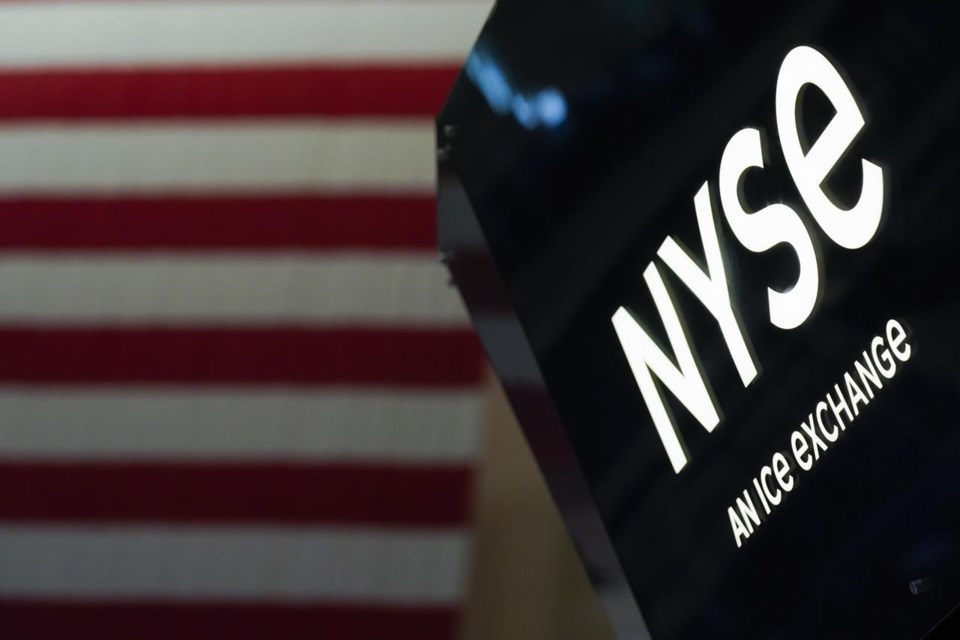NEW YORK (AP) — Wall Street steamed to its best day since January after Meta Platforms became the latest Big Tech company to blow past profit forecasts. The S&P 500 rose 2% Thursday. The Dow rose 1.6% and the Nasdaq added 2.4%. Facebook’s parent company did the heaviest lifting with an increase of 13.9%. Expectations were broadly low coming into this earnings reporting season, in part because of a slowing economy. A report suggested the economy slowed even more than expected in the first quarter, but it also showed signs of underlying strength. Treasury yields rose on expectations the Federal Reserve will raise interest rates again next week.
THIS IS A BREAKING NEWS UPDATE. AP’s earlier story follows below.
NEW YORK (AP) — Wall Street is steaming toward its best day since January after Meta Platforms on Thursday became the latest Big Tech company to blow past profit expectations and reports painted a mixed picture of the U.S. economy.
The S&P 500 was 2% higher in late trading and on pace to erase all its losses from what had been a tough week so far. The Dow Jones Industrial Average was up 551 points, or 1.7%, at 33,853 as of 3 p.m. Eastern time, while the Nasdaq composite was leading the market with a 2.4% gain.
Facebook’s parent company was doing the heaviest lifting, and it jumped 14.6%. Not only did Meta beat analysts’ estimates for profit during the first three months of the year, it also gave a forecast for revenue that topped expectations.
The majority of companies have been beating forecasts so far this earnings reporting season. Hasbro climbed 14%, and Comcast rose 9.7% after they also topped Wall Street’s estimates. But expectations were broadly low coming into this reporting season because of still-high inflation, much higher interest rates and a slowing economy.
A report on Thursday gave the first indication of just how much the U.S. economy is slowing: down to an estimated 1.1% growth at an annual rate during the first three months of 2023 from 2.6% at the end of last year. That was a worse slowdown than expected, but the economy may be in better shape than it looks.
Underneath the surface, the report showed strength at the economy’s core, with growth in spending by consumers and other areas accelerating. Much of the weakness was related to businesses thinning out inventories. Also within the data, though, was a measure of inflation that the Fed prefers to use, which came in hotter than hoped.
A separate report showed that fewer workers applied for unemployment benefits last week, raising hope that the job market may be remaining resilient as other areas slow.
“In our view, pulled all together, the conflicting data signals to us that we are in the ‘bend, not break’ phase of the cycle” for the economy, said Alexandra Wilson-Elizondo, co-head of portfolio management for multi asset solutions at Goldman Sachs Asset Management.
As a whole, investors took the data to mean the Federal Reserve next week will see the economy is still strong enough to handle another hike to interest rates at its next meeting.
The Fed has been raising rates at a furious pace since early last year, up to the highest level since 2007 from its record low. It’s doing so in hopes of getting the nation’s high inflation under control, but high rates do that by slowing the entire economy and hurting prices for investments.
Treasury yields jumped immediately after the economic reports hit Wall Street as traders upped their forecasts for the Fed and rates.
The yield on the 10-year Treasury rose to 3.52% from 3.45% late Wednesday. It helps set rates for mortgages and other important loans.
The two-year yield, which moves more on expectations for the Fed, rose more aggressively, up to 4.08% from 3.95%.
High rates have hit some areas of the economy particularly hard, including the housing and manufacturing industries. Banks have also come under pressure amid fears that scared customers may suddenly yank out all their deposits at once.
The hunt has been on for potential weak links, and Wall Street's spotlight has been particularly harsh on First Republic Bank. Its stock has more than halved this week after it gave details about how much in deposits its customers pulled following the second- and third-largest U.S. bank failures in history last month.
Its stock steadied a bit Thursday, rising 11.9%.
The larger worry is that the banking industry's struggles could lead to a pullback in lending across the economy. That in turn could tighten the brakes even further, acting almost like another hike to interest rates.
That has many investors preparing for a possible recession this year, which could mean further hits to corporate profits. It's also why investors have been paying just as much, if not more, attention to what companies say about upcoming trends as to what they actually did in the past three months.
Caterpillar, which is considered a bellwether for the global economy, slipped 0.3% despite reporting stronger profit and revenue for the latest quarter than expected. Analysts pointed to concerns that its profitability may have maxed out. It also benefited from a bigger-than-expected buildup in dealer inventories.
Crocs tumbled 15.9% despite reporting stronger profit and revenue for its latest quarter than expected. It gave financial forecasts for the current quarter that fell short of some analysts' expectations.
In markets overseas, stock indexes were mixed in Europe and modestly higher across much of Asia.
Japan's Nikkei 225 rose 0.1% as the Bank of Japan began a two-day monetary policy meeting under its new governor, Kazuo Ueda. No immediate change is expected to the nation’s super-easy monetary policy.
___
AP Business Writers Yuri Kageyama and Matt Ott contributed.
Stan Choe, The Associated Press



